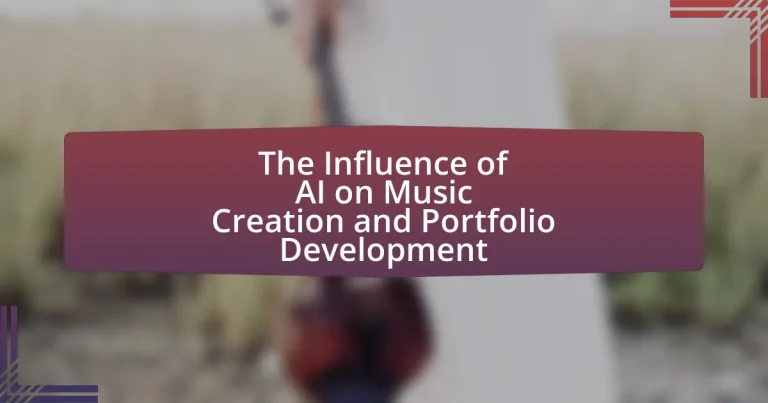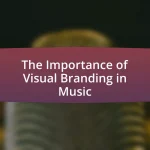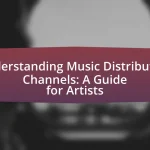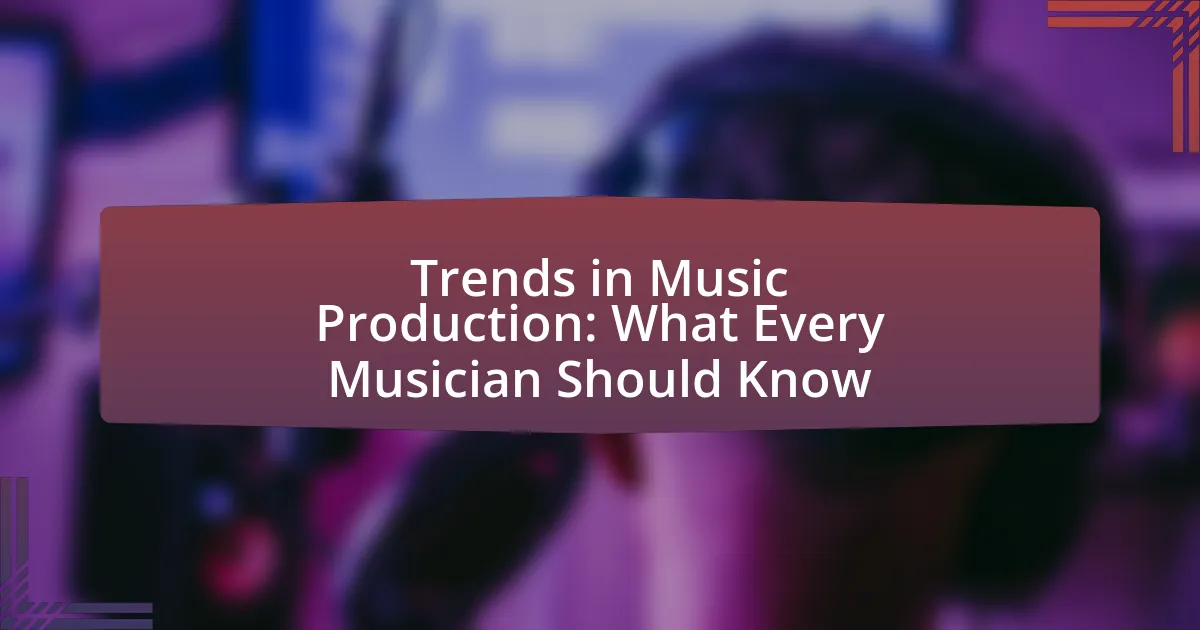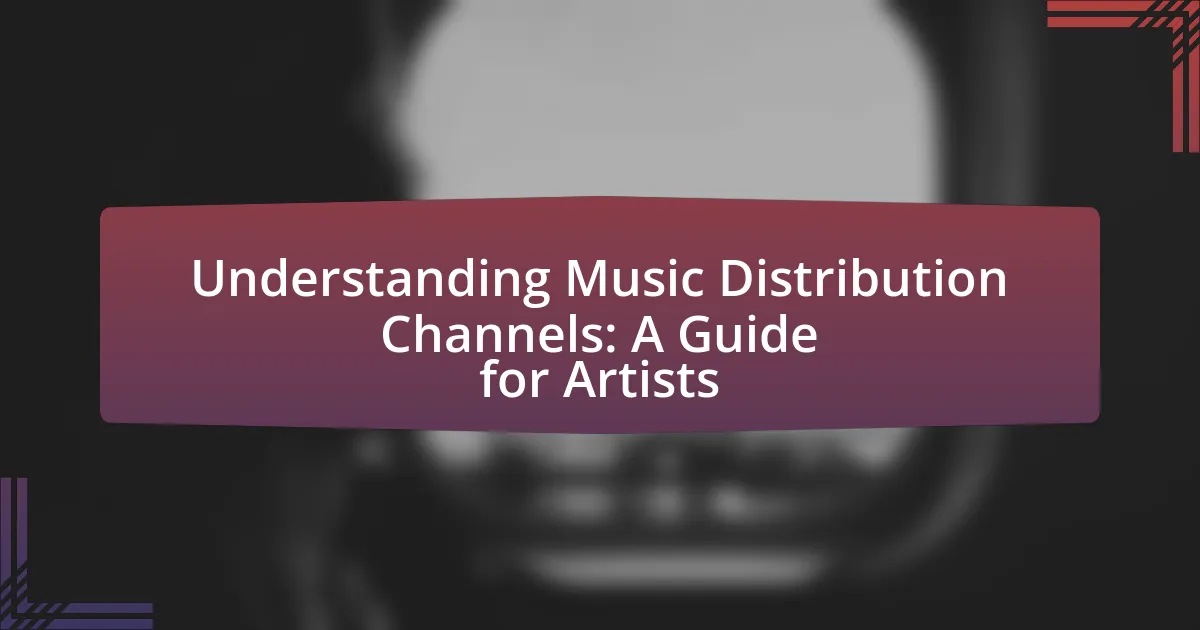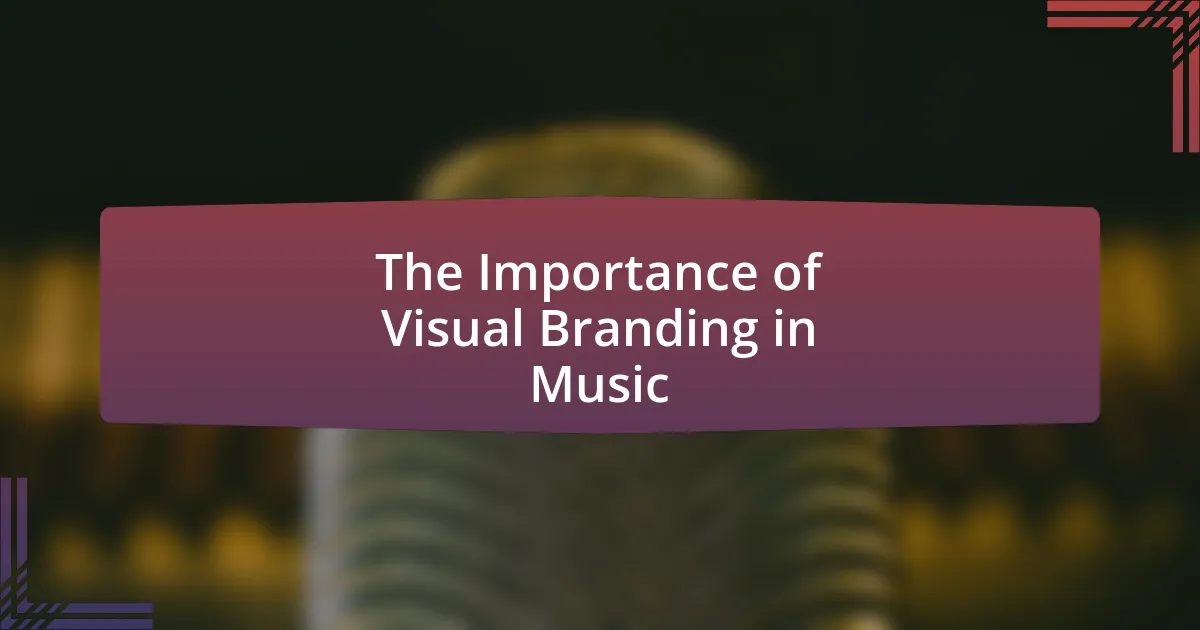The article examines the significant influence of artificial intelligence (AI) on music creation and portfolio development. It highlights how AI tools, such as OpenAI’s MuseNet and Google’s Magenta, automate composition processes, enhance creativity, and allow musicians to tailor their portfolios based on market trends and listener preferences. The discussion includes the transformation of the music creation process through AI technologies, the benefits and challenges of integrating AI into music, and the implications for marketing and distribution. Additionally, it explores strategies for musicians to effectively leverage AI in their careers and the resources available for learning about AI in music.
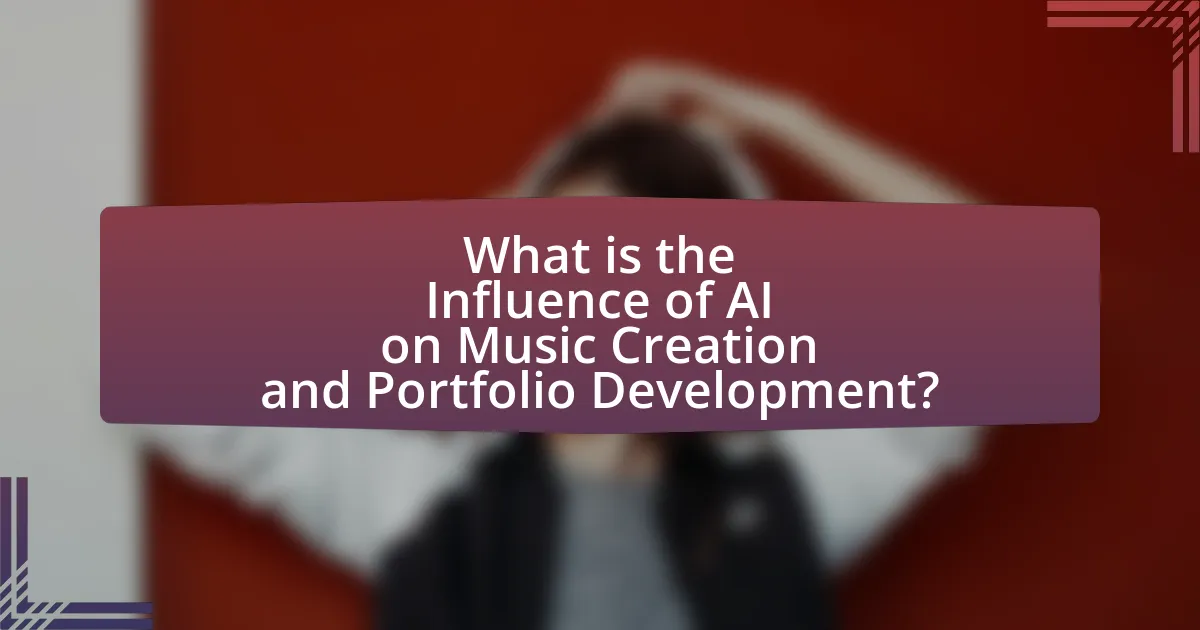
What is the Influence of AI on Music Creation and Portfolio Development?
AI significantly influences music creation and portfolio development by automating composition processes and enhancing creative possibilities. AI tools, such as OpenAI’s MuseNet and Google’s Magenta, enable musicians to generate original compositions, remix existing tracks, and explore new genres, thereby expanding their creative horizons. Furthermore, AI algorithms analyze market trends and listener preferences, allowing artists to tailor their portfolios to meet audience demands effectively. For instance, a study by the International Journal of Music Technology and Education highlights that AI-driven analytics can increase an artist’s engagement by up to 30% through personalized content recommendations. This integration of AI not only streamlines the creative process but also optimizes portfolio strategies, making it a transformative force in the music industry.
How is AI transforming the music creation process?
AI is transforming the music creation process by enabling composers and artists to generate music through algorithms and machine learning models. These technologies analyze vast datasets of existing music to create new compositions, allowing for innovative sounds and styles that may not have been conceived by human creators alone. For instance, platforms like OpenAI’s MuseNet and Google’s Magenta utilize deep learning to compose original pieces across various genres, demonstrating AI’s capability to mimic and innovate within musical frameworks. This shift not only enhances creativity but also streamlines the production process, making music creation more accessible to individuals without formal training.
What tools and technologies are being used in AI music creation?
AI music creation utilizes tools and technologies such as machine learning algorithms, neural networks, and software platforms like OpenAI’s MuseNet, Google’s Magenta, and AIVA. These technologies enable the generation of original compositions by analyzing vast datasets of existing music, learning patterns, and creating new pieces that mimic various styles. For instance, MuseNet can generate music in multiple genres by leveraging deep learning techniques, while AIVA is specifically designed for composing classical music. The effectiveness of these tools is evidenced by their ability to produce high-quality music that often passes as human-composed, demonstrating the significant advancements in AI’s role in music creation.
How does AI enhance creativity in music composition?
AI enhances creativity in music composition by providing tools that assist composers in generating new ideas, exploring diverse musical styles, and automating repetitive tasks. For instance, AI algorithms can analyze vast datasets of existing music to identify patterns and suggest novel chord progressions or melodies, thereby expanding the creative palette available to musicians. Research conducted by the Georgia Institute of Technology demonstrated that AI systems like AIVA and OpenAI’s MuseNet can compose original pieces that are stylistically similar to human-created music, showcasing their ability to innovate within established genres. This capability allows composers to experiment with combinations they may not have considered, ultimately leading to more diverse and innovative musical works.
What role does AI play in the development of a music portfolio?
AI plays a significant role in the development of a music portfolio by enabling artists to create, analyze, and optimize their music more efficiently. Through machine learning algorithms, AI can analyze vast amounts of data from existing music to identify trends, styles, and audience preferences, allowing artists to tailor their portfolios to meet market demands. For instance, platforms like Amper Music and AIVA utilize AI to assist musicians in composing original tracks, thereby expanding their creative possibilities and enhancing their portfolios with diverse sounds. Additionally, AI-driven tools can provide insights into the performance of tracks across streaming services, helping artists refine their portfolios based on listener engagement and feedback. This data-driven approach not only streamlines the creative process but also increases the likelihood of commercial success in a competitive industry.
How can AI assist musicians in curating their portfolios?
AI can assist musicians in curating their portfolios by analyzing their music and providing data-driven insights on audience preferences and trends. This technology can evaluate various aspects of a musician’s work, such as genre, tempo, and lyrical themes, to recommend the most impactful pieces for inclusion in a portfolio. For instance, AI tools like Spotify for Artists offer analytics that show which songs resonate most with listeners, enabling musicians to make informed decisions about which tracks to showcase. Additionally, AI can automate the organization of music files and suggest optimal presentation formats, enhancing the overall appeal of the portfolio.
What are the implications of AI on music marketing and distribution?
AI significantly transforms music marketing and distribution by enabling personalized marketing strategies and optimizing distribution channels. Through data analysis, AI can identify listener preferences and behaviors, allowing music marketers to tailor campaigns that resonate with specific audiences. For instance, platforms like Spotify utilize AI algorithms to curate personalized playlists, which enhances user engagement and increases the likelihood of music discovery. Additionally, AI-driven tools streamline distribution processes by automating tasks such as rights management and royalty tracking, thereby reducing operational costs and improving efficiency. According to a report by the International Federation of the Phonographic Industry (IFPI), the use of AI in music distribution has led to a 30% increase in efficiency for many labels, demonstrating the tangible benefits of AI integration in the industry.
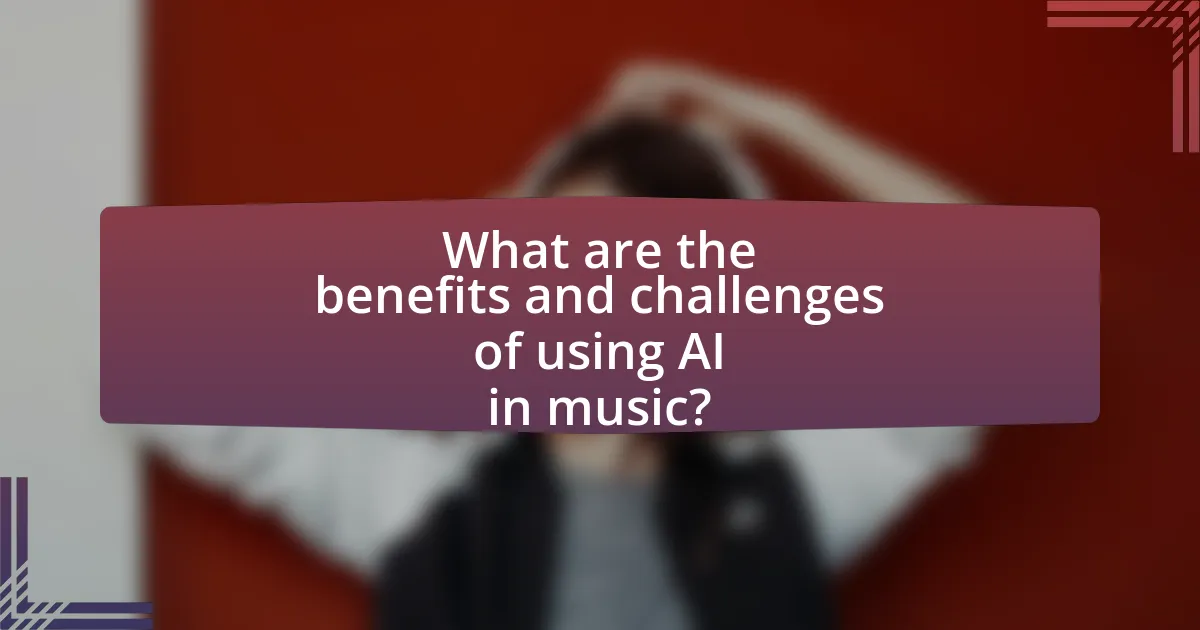
What are the benefits and challenges of using AI in music?
The benefits of using AI in music include enhanced creativity, efficiency in music production, and personalized music experiences. AI algorithms can analyze vast amounts of data to generate new compositions, allowing artists to explore innovative sounds and styles. For instance, platforms like AIVA and Amper Music utilize AI to assist musicians in creating original tracks quickly, significantly reducing production time.
Conversely, challenges of using AI in music involve concerns about originality, the potential loss of human touch, and ethical issues regarding copyright. Critics argue that AI-generated music may lack the emotional depth and nuance that human composers bring, leading to a homogenization of musical styles. Additionally, the use of AI raises questions about ownership and rights, as seen in debates surrounding the use of AI-generated content in commercial music.
What advantages does AI offer to musicians and composers?
AI offers musicians and composers enhanced creativity, efficiency, and access to new tools for music production. By utilizing AI algorithms, artists can generate unique melodies, harmonies, and rhythms, which can inspire new compositions. Additionally, AI can analyze vast amounts of musical data, allowing musicians to identify trends and preferences in their target audience, thus tailoring their work more effectively. For instance, AI-driven platforms like Amper Music and AIVA enable users to create music quickly, reducing the time spent on repetitive tasks and allowing for more focus on artistic expression. These advantages demonstrate how AI can significantly transform the music creation process and portfolio development for artists.
How does AI improve efficiency in music production?
AI improves efficiency in music production by automating repetitive tasks, enabling faster composition, and enhancing sound design. For instance, AI algorithms can analyze vast amounts of musical data to generate chord progressions, melodies, and even entire tracks, significantly reducing the time artists spend on these elements. Additionally, AI tools like LANDR and AIVA assist in mastering and arranging music, streamlining the production process. Research indicates that AI can cut production time by up to 30%, allowing musicians to focus more on creativity and less on technical details.
What new opportunities does AI create for emerging artists?
AI creates new opportunities for emerging artists by enabling innovative music creation, enhancing portfolio development, and providing access to diverse tools and platforms. With AI-driven software, artists can generate unique compositions, explore new genres, and collaborate with algorithms that analyze trends and preferences, allowing for more personalized and engaging music. Additionally, AI tools facilitate the creation of high-quality visuals and marketing materials, helping artists to build a professional portfolio that stands out in a competitive landscape. The integration of AI in music production has been shown to reduce costs and time, making it more accessible for emerging artists to produce and distribute their work effectively.
What challenges do musicians face when integrating AI into their work?
Musicians face several challenges when integrating AI into their work, including concerns about creativity, copyright issues, and the need for technical skills. The integration of AI can lead to a perceived loss of artistic authenticity, as musicians may worry that AI-generated content lacks the emotional depth of human-created music. Additionally, copyright challenges arise when determining ownership of AI-generated works, complicating the legal landscape for musicians. Furthermore, musicians often need to acquire new technical skills to effectively use AI tools, which can be a barrier for those who are not technologically inclined. These challenges highlight the complexities musicians encounter as they navigate the evolving landscape of AI in music creation.
How does reliance on AI affect artistic authenticity?
Reliance on AI affects artistic authenticity by introducing algorithmic processes that can dilute the personal expression inherent in art. When artists depend heavily on AI tools for creation, the unique emotional and subjective elements that define authenticity may be compromised, as AI often generates outputs based on patterns and data rather than personal experience. For instance, a study by the University of Cambridge found that music created with AI lacks the nuanced emotional depth typically found in human-composed pieces, suggesting that while AI can enhance creativity, it may also lead to a homogenization of artistic expression.
What ethical considerations arise from AI-generated music?
AI-generated music raises several ethical considerations, primarily concerning copyright, authorship, and the potential for cultural appropriation. Copyright issues arise because AI systems often learn from existing music, which can lead to questions about ownership of the generated content. For instance, if an AI creates a piece that closely resembles a copyrighted song, it may infringe on the original artist’s rights. Additionally, authorship becomes complex; determining whether the AI, its developers, or the users should be credited as the creator is a contentious topic. Cultural appropriation is another concern, as AI may inadvertently replicate and commercialize elements from specific cultures without proper acknowledgment or respect, potentially leading to exploitation. These considerations highlight the need for clear guidelines and ethical frameworks to navigate the implications of AI in music creation.
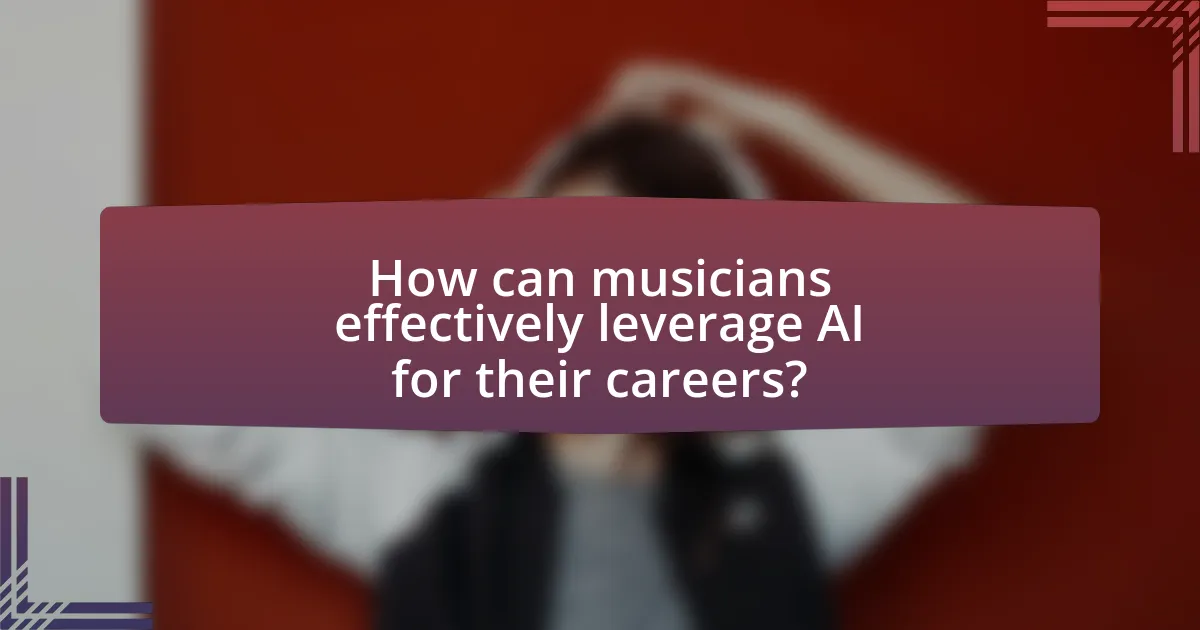
How can musicians effectively leverage AI for their careers?
Musicians can effectively leverage AI for their careers by utilizing AI-driven tools for music composition, production, and marketing. These tools can analyze vast amounts of data to generate unique melodies, harmonies, and rhythms, allowing musicians to enhance their creative processes. For instance, platforms like Amper Music and AIVA enable artists to create original compositions quickly, which can lead to increased productivity and innovation in their work. Additionally, AI algorithms can optimize marketing strategies by analyzing listener preferences and trends, helping musicians target their audience more effectively. According to a report by the International Federation of the Phonographic Industry, the use of AI in music can lead to a 30% increase in engagement on streaming platforms, demonstrating its potential impact on a musician’s reach and success.
What strategies can musicians adopt to incorporate AI into their creative process?
Musicians can adopt several strategies to incorporate AI into their creative process, including using AI-driven composition tools, leveraging machine learning for sound design, and employing AI for personalized music recommendations. AI-driven composition tools, such as OpenAI’s MuseNet, allow musicians to generate melodies and harmonies based on specific styles or genres, enhancing creativity and providing new musical ideas. Additionally, machine learning algorithms can analyze vast libraries of sounds to create unique soundscapes, enabling musicians to experiment with innovative textures and timbres. Furthermore, AI can analyze listener preferences and trends, helping musicians tailor their portfolios to audience demands, as evidenced by platforms like Spotify utilizing AI for personalized playlists. These strategies demonstrate how AI can enhance creativity and adapt to the evolving landscape of music creation.
How can musicians balance AI tools with traditional methods?
Musicians can balance AI tools with traditional methods by integrating AI as a complementary resource rather than a replacement. This approach allows musicians to leverage AI for tasks such as generating ideas, automating repetitive processes, or enhancing sound quality while still relying on their creative instincts and traditional techniques for composition and performance. For instance, a study by the University of California, Berkeley, found that musicians who utilized AI-assisted composition tools reported increased creativity and efficiency, suggesting that AI can enhance rather than hinder traditional artistry. By maintaining a hybrid workflow, musicians can harness the strengths of both AI and traditional methods to enrich their creative output.
What are best practices for using AI in music portfolio development?
Best practices for using AI in music portfolio development include leveraging AI tools for composition, utilizing data analytics for audience insights, and employing AI-driven marketing strategies. AI tools like OpenAI’s MuseNet and AIVA can assist in generating original compositions, allowing musicians to explore new creative avenues. Data analytics platforms can analyze listener preferences and trends, enabling artists to tailor their portfolios to meet audience demands. Additionally, AI-driven marketing tools can optimize promotional efforts, ensuring that music reaches the right audience effectively. These practices enhance creativity, improve audience engagement, and streamline marketing efforts, ultimately leading to a more robust music portfolio.
What resources are available for musicians interested in AI?
Musicians interested in AI can access a variety of resources, including online courses, software tools, and community forums. Online platforms like Coursera and Udemy offer courses specifically focused on AI in music, such as “Music and Artificial Intelligence” by Berklee College of Music. Software tools like AIVA and Amper Music provide AI-driven music composition capabilities, allowing musicians to experiment with AI-generated music. Additionally, forums like Reddit’s r/musicians and specialized groups on Facebook facilitate discussions and knowledge sharing among musicians exploring AI technologies. These resources collectively support musicians in integrating AI into their creative processes and portfolio development.
Where can musicians find AI tools and platforms for music creation?
Musicians can find AI tools and platforms for music creation on websites such as Amper Music, AIVA, and Soundtrap. Amper Music offers an AI-driven platform that allows users to create and customize music tracks easily, while AIVA specializes in composing original music using artificial intelligence. Soundtrap provides a collaborative online studio that integrates AI features for music production. These platforms are widely recognized in the industry for their innovative use of AI in music creation, making them valuable resources for musicians looking to enhance their creative process.
What educational opportunities exist for learning about AI in music?
Educational opportunities for learning about AI in music include online courses, university programs, workshops, and specialized training sessions. Institutions like Berklee College of Music offer courses specifically focused on AI applications in music, while platforms such as Coursera and edX provide access to courses from universities that cover machine learning and its implications in music composition and production. Additionally, workshops hosted by organizations like the Music and Audio Research Lab at NYU explore practical applications of AI in music creation. These educational avenues equip learners with the necessary skills to integrate AI technologies into their music practices effectively.
